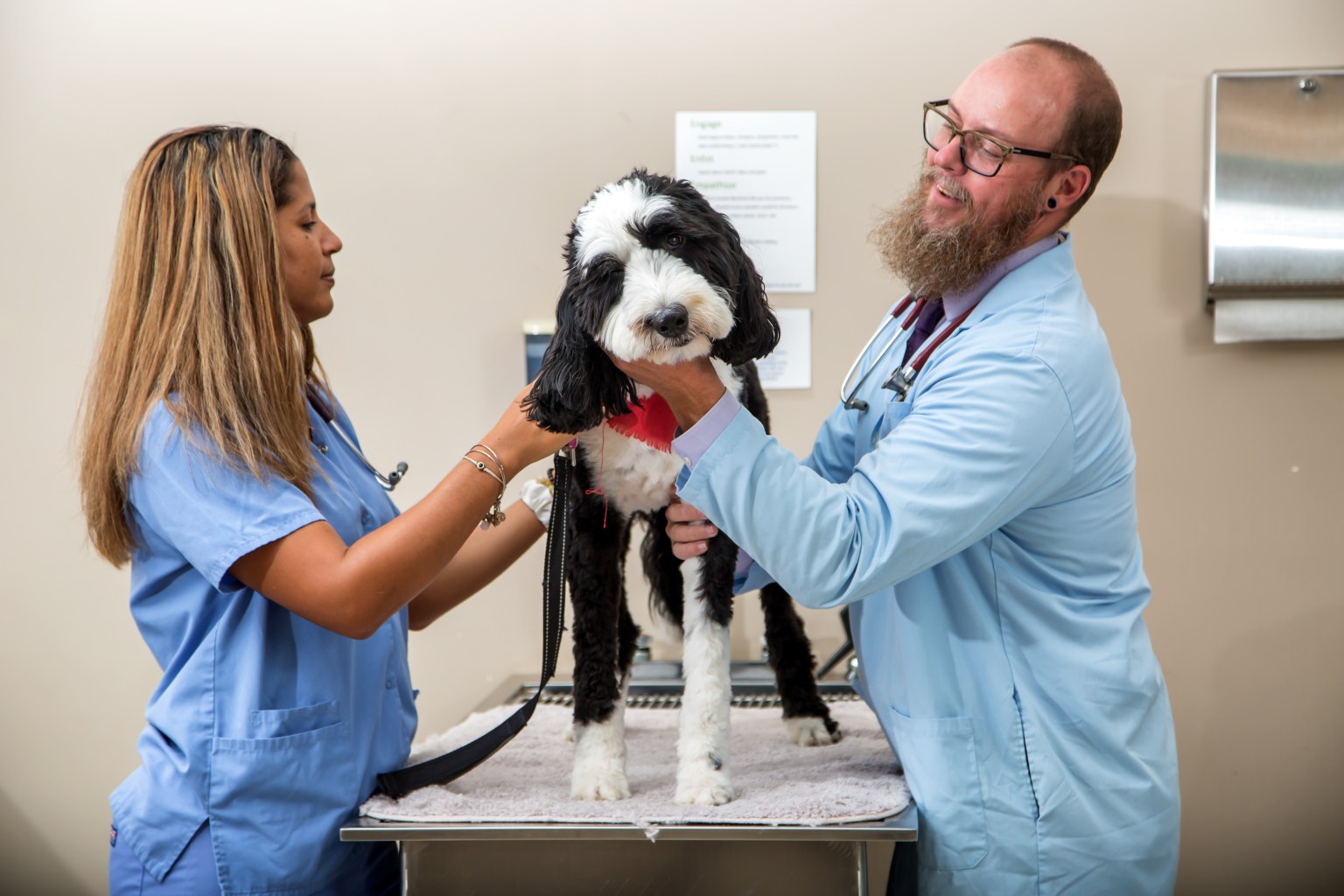Healing tips following Pet Cancer Surgery
Wiki Article
Comprehensive Overview to the Solutions Offered by a Vet Oncologist
Veterinary oncology incorporates a wide variety of services focused on diagnosing and dealing with cancer in animals. Veterinary Oncology Services. Oncologists utilize sophisticated diagnostic methods and provide different therapy alternatives customized per animal's requirements. They likewise focus on encouraging treatment and provide beneficial resources for pet dog proprietors. Understanding these solutions is crucial for making educated decisions. What specific aspects of vet oncology can significantly affect a family pet's treatment journey?Understanding Veterinary Oncology
Vet oncology is a specialized field concentrated on treating and diagnosing cancer in pets. This self-control encompasses a wide variety of techniques, from medical treatments such as radiation treatment and immunotherapy to medical treatments targeted at getting rid of growths. Veterinary oncologists are educated to recognize the distinct indications of cancer in various types, enabling them to tailor treatment strategies to individual clients.Along with conventional therapies, veterinary oncology highlights supportive care, which plays an essential duty in boosting the lifestyle for damaged pets. This consists of discomfort management, nutritional assistance, and palliative care options. Cooperation with pet owners is essential, as they are indispensable to decision-making regarding their family pets' treatment paths. As study developments, vet oncology proceeds to progress, using brand-new hope and enhanced results for animals diagnosed with cancer. In general, this field is basic for resolving the intricacies of cancer in friend animals.
Advanced Diagnostic Techniques
Advanced diagnostic methods play a crucial duty in vet oncology, giving crucial insights into the existence and extent of cancer in animals. Imaging techniques such as ultrasound, CT scans, and MRI are frequently used to visualize tumors and examine their features. Furthermore, biopsy procedures are very important for acquiring tissue samples, enabling conclusive medical diagnosis and customized therapy plans.Imaging Modalities Utilized
Imaging methods play an important duty in the medical diagnosis and monitoring of cancer cells in pets. Vet oncologists make use of various innovative imaging techniques to evaluate growth transition, existence, and size. Radiography, or X-rays, offers a preliminary sight of bone and breast problems, while ultrasound offers real-time imaging of soft cells, permitting detailed analysis of interior organs. Computed tomography (CT) improves visualization of complicated physiological frameworks and enables 3D repairs, aiding in exact lump localization. Magnetic vibration imaging (MRI) is important for soft tissue distinction, particularly in brain tumors. In addition, nuclear medication strategies such as positron exhaust tomography (FAMILY PET) assistance identify metabolic task within growths. Jointly, these modalities improve analysis precision, leading effective treatment methods for oncological people.Biopsy Treatments Explained
Complying with the initial evaluation through imaging modalities, obtaining a conclusive diagnosis commonly calls for cells tasting via biopsy treatments. Vet oncologists utilize various biopsy methods based upon the lump's location and qualities. Great needle aspiration (FNA) is a minimally invasive approach that removes cells for cytological examination, suitable for shallow masses. Core needle biopsies give larger tissue samples and serve for much deeper tumors, permitting histopathological evaluation. Surgical biopsies entail excising a portion or the whole tumor, promoting detailed examination. These procedures not just verify the visibility of cancer cells but additionally help identify its type and quality, directing therapy decisions. Each biopsy method is selected carefully to stabilize diagnostic accuracy with patient security and convenience.Therapy Alternatives for Cancer in Family pets
When a pet is diagnosed with cancer, a range of treatment options appear to help take care of the condition and enhance lifestyle. Vet oncologists normally recommend a multidisciplinary strategy tailored to the specific animal's requirements, which may include surgical procedure, radiation therapy, immunotherapy, or different therapies.Surgery is frequently employed to remove lumps and afflicted cells, possibly leading to full remission in many cases. Radiation therapy aims to damage and target cancer cells, minimizing lump size and reducing signs and symptoms - Veterinary Oncologist. Immunotherapy takes advantage of the pet's body immune system to fight cancer better, while alternative therapies could include acupuncture or natural supplements to sustain overall wellness
Each therapy option carries its own benefits and risks, and veterinary oncologists work closely with animal owners to make a detailed plan that lines up with the animal's details medical diagnosis and the owner's wishes. The utmost objective is to boost the pet dog's comfort and lifestyle throughout their cancer journey.
Radiation treatment for Pets
Chemotherapy is a typical therapy choice for pet dogs diagnosed with cancer and is commonly utilized together with various other therapies detailed by veterinary oncologists. This therapy includes the management of particular medications made to destroy and target cancer cells, therefore decreasing lump size and protecting against the spread of the disease. Vet oncologists customize radiation treatment procedures based on the sort of cancer, the pet dog's total wellness, and the preferred treatment outcome.Side impacts can happen, as these medications may additionally influence healthy and balanced cells. Common reactions consist of queasiness, throwing up, and momentary adjustments in hunger - Board Certified Veterinary Oncologist. Veterinary oncologists are equipped to take care of these side results successfully, making sure the family pet's convenience throughout the therapy process. Routine tracking with blood tests and follow-up consultations is necessary to assess the family pet's feedback to radiation treatment and make essential changes. Ultimately, chemotherapy can give substantial benefits, boosting the quality of life for animals facing cancer cells diagnoses

Radiation Treatment in Vet Medication
Radiation treatment acts as an efficient treatment choice for family pets identified with localized tumors, providing a targeted strategy to cancer cells administration. This technique utilizes high-energy radiation to damage the DNA of cancer cells, inhibiting their capacity to proliferate. It is especially useful for growths that are not open to surgical elimination or for situations where surgery may not be viable because of the tumor's place.Veterinary oncologists customize radiation protocols based upon tumor kind, place, and dimension, along with the family pet's overall wellness. Treatment can be delivered using external beam radiation or brachytherapy, each with unique advantages. Typically, multiple sessions are required to take full advantage of efficiency while lessening adverse effects.
Although pets might experience temporary Board Certified Veterinary Oncologist reactions such as skin irritability, the overall goal is to reduce tumors and minimize symptoms, eventually improving the family pet's prognosis and high quality of life. Appropriately, radiation treatment plays an important function in complete cancer care.
Palliative Treatment and Lifestyle
Palliative care in veterinary oncology concentrates on improving the top quality of life for animals dealing with terminal health problems, making certain convenience and self-respect in their final days. This specialized method prioritizes pain management, sign control, and psychological assistance. Veterinary oncologists evaluate each pet dog's specific needs, tailoring treatments to alleviate pain and improve overall wellness.Methods may include providing medications for pain alleviation, taking care of queasiness, and addressing various other traumatic symptoms. Additionally, nutritional support is often provided to keep stamina and enhance hunger. The emotional aspect of palliative treatment is similarly important; creating a calm environment aids minimize anxiety for both pet dog and owner.
Eventually, the objective of palliative care is to allow pet dogs to enjoy their continuing to be time with as much delight and dignity as feasible. By focusing on convenience and high quality of life, veterinary oncologists play a vital role in making certain that family pets and their families browse this tough journey with empathy and understanding.
Support for Pet Owners Throughout Therapy

Psychological Support for Owners
Charting the emotional landscape throughout an animal's cancer cells treatment can be a frustrating experience for proprietors. The uncertainty surrounding medical diagnosis and prognosis can result in sensations of anxiety, vulnerability, and despair. Veterinary oncologists identify the value of psychological support and often supply guidance to help proprietors browse this tough trip. Communication is necessary; talking about therapy options and prospective outcomes can reduce some concerns. In addition, offering peace of mind that psychological actions stand fosters a supportive atmosphere. Numerous oncology centers might also suggest assistance teams or counseling services tailored for family pet proprietors, promoting common experiences. Urging owners to prioritize self-care during this time is crucial, as their emotional wellness directly affects their pet dog's comfort and overall treatment experience.
Resources and Educational Materials
Steering with the complexities of a pet's cancer cells treatment can be intimidating for proprietors, making access to academic materials and dependable resources essential. Vet oncologists often offer a variety of handouts, pamphlets, and online materials that clarify therapy choices, prospective side effects, and treatment strategies. These sources assist demystify the process and empower family pet owners to make enlightened choices. Furthermore, many oncology clinics use access to support discussion forums and groups where proprietors can get in touch with others facing comparable obstacles, promoting a sense of area. Educational workshops and webinars performed by vet professionals further boost understanding, guaranteeing that owners are well-equipped to navigate their pet dog's trip through cancer cells treatment with confidence and knowledge.Frequently Asked Inquiries
Exactly How Can I Prepare My Pet Dog for a Veterinary Oncology Visit?
Preparing a pet for a veterinary oncology visit entails gathering clinical records, keeping in mind signs, and ensuring the animal fits. A calm demeanor and familiar items can help reduce anxiety during the consultation.What Are the Signs My Family Pet May Have Cancer Cells?
Signs that a family pet might have cancer include unexplained weight reduction, consistent throwing up or looseness of the bowels, uncommon lumps or swellings, sleepiness, changes in hunger, trouble breathing, and alterations in behavior. Prompt veterinary interest is vital.Just How Can I Assistance My Pet Mentally During Treatment?
Sustaining a family pet psychologically throughout therapy entails giving convenience, keeping regimens, using mild love, and making certain a tranquil setting. Engaging in quiet play and regular companionship helps reduce tension and promotes a feeling of safety and security.Exist Alternate Therapies for Pets With Cancer cells?
Alternate therapies for pet dogs with cancer cells include acupuncture, herbal therapies, and dietary support. These approaches may match conventional therapies, promoting general well-being. Consulting with a vet is necessary for safe and reliable combination of alternate treatments.What Expenses Should I Expect for Vet Oncology Services?
The awaited prices for veterinary oncology services can differ substantially, commonly influenced by diagnostics, therapies, and continuous treatment. Animal owners must get ready for costs ranging from consultations to specialized treatments, reflecting the complexity of cancer cells management.Cooperation with family pet proprietors is crucial, as they are indispensable to decision-making regarding their pets' therapy paths. Each treatment choice brings its own advantages and dangers, and veterinary oncologists work very closely with pet dog proprietors to create a comprehensive plan that straightens with the animal's details diagnosis and the proprietor's dreams. Family pets may experience momentary reactions such as skin inflammation, the total objective is to diminish lumps and ease symptoms, ultimately enhancing the pet dog's prognosis and quality of life. Support for pet dog proprietors during therapy is important in guiding via the psychological challenges associated with an animal's cancer diagnosis. Preparing an animal for a veterinary oncology check out includes celebration medical records, noting symptoms, and guaranteeing the family pet is comfy.
Report this wiki page